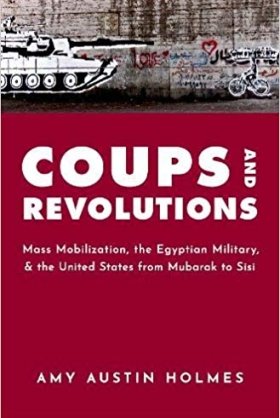Coups and Revolutions: Mass Mobilization, the Egyptian Military, and the United States from Mubarak to Sisi


-
In 2011, Egypt witnessed more protests than any other country in the world. Counter to the received narrative, Amy Austin Holmes argues that the ousting of Mubarak in 2011 did not represent the culmination of a revolution or the beginning of a transition period, but rather the beginning of a revolutionary process that would unfold in three waves, followed by two waves of counterrevolution. This book offers the first analysis of both the revolution and counterrevolution in Egypt from January 2011 until June 2018.
The period of revolutionary upheaval played out in three uprisings against three distinct forms of authoritarian rule: the Mubarak regime and the police state that protected it, the unelected military junta known as the Supreme Council of Armed Forces, and the religious authoritarianism of the Muslim Brotherhood. The counterrevolution occurred over two periods: the first under Adly Mansour as interim president and the second after El Sisi was elected president. While the regime imprisoned or killed the leadership of the Muslim Brotherhood and many secular activists during the first wave of the counterrevolution, it turned against civil society at large during the second: NGOs, charities, media, academia, and minority groups.
In addition to providing new and unprecedented empirical data, Coups and Revolutions makes two theoretical contributions. First, it presents a new framework for analyzing the state apparatus in Egypt based on four pillars of regime support that can either prop up or press upon whoever is in power. These are the Egyptian military, the business elite, the United States, and the multi-headed opposition. Secondly, the book brings together the literature on bottom-up revolutionary movements and top-down military coups, and it introduces the concept of a coup from below in contrast to the revolution from above that took place under Gamal Abdel Nasser.Author
 Amy Austin HolmesPublic Policy Fellow;
Amy Austin HolmesPublic Policy Fellow;
Research Professor of International Affairs and Acting Director of the Foreign Area Officers Program, George Washington UniversityMiddle East Program
The Wilson Center’s Middle East Program serves as a crucial resource for the policymaking community and beyond, providing analyses and research that helps inform US foreign policymaking, stimulates public debate, and expands knowledge about issues in the wider Middle East and North Africa (MENA) region. Read more
Browse Insights & AnalysisExplore More
Browse Insights & Analysis
Greenland’s New Governing Coalition Signals Consensus
Posted date/time:
Myanmar’s Junta and the 2026 Elections: A Fig Leaf for Legitimacy?
Duration:15.24Posted date/time:
Imamoglu’s Arrest Sparks Nationwide Unrest and Raises Fears for Turkish Democracy
Duration:2:32Posted date/time:
